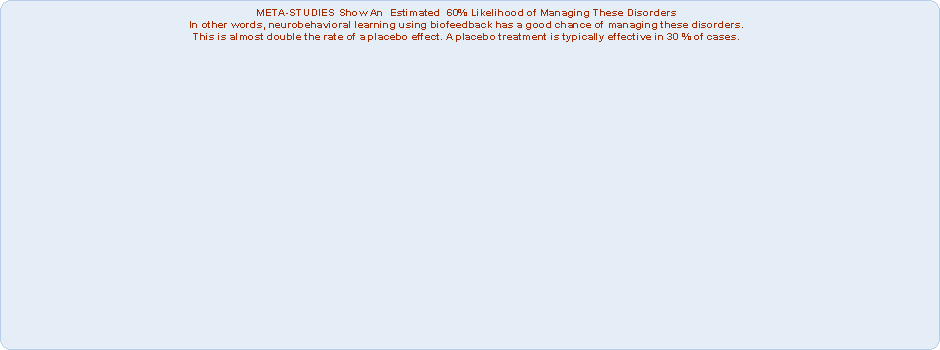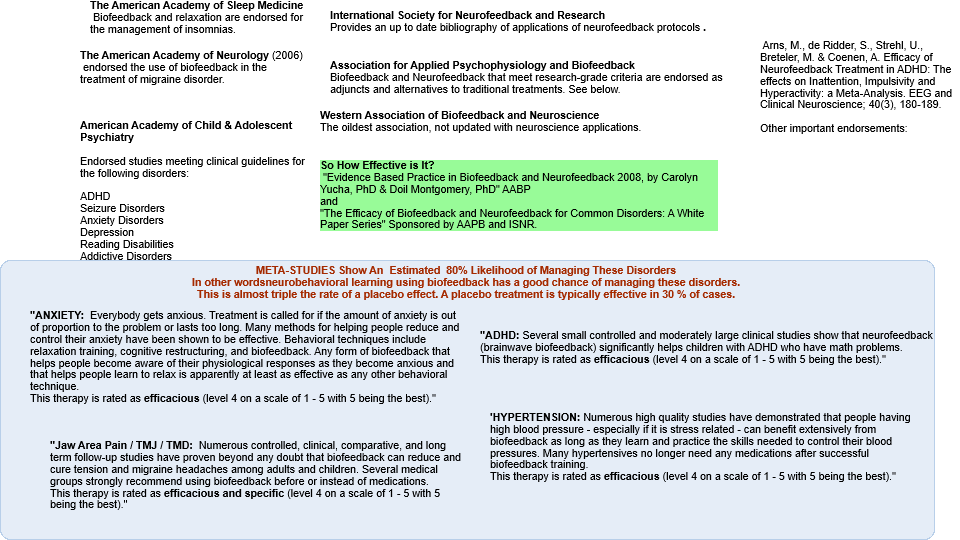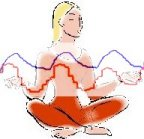
BIOFEEDBACK and NEUROFEEDBACK: THE EVIDENCE
From http://www.aapb.org/disorders_home.html

Research on the success of biofeedback in treating certain conditions is inconclusive or needs to be validated. Some research studies use a small number of participants, which makes it difficult to generalize the results to a larger population. Also, many conditions have different subtypes with a variety of psychological, social, and physical causes. This fact, combined with research design concerns, makes it difficult to compare research studies. For example, while most studies have reported positive outcomes in the treatment of alcohol abuse and dependence, problems with methods and statistical analyses have called study results into question. Also, its effectiveness in treating opiate abuse or dependence has not been consistently shown, as with its use in treating menopausal hot flashes, and there are limitations in studies relating to its use in cancer treatment. Continued research is needed to further evaluate and improve different biofeedback techniques for various conditions.

"ASTHMA / HYPERVENTILATION: A relatively large, controlled study by Lehrer et al (2004) showed that biofeedback can have a highly significant impact on the severity of asthma related symptoms. Small clinical studies have also shown positive effects of biofeedback."
This therapy is rated as probably efficacious (level 3 on a scale of 1 - 5 with 5 being the best).
"INSOMNIA: Both the National Institutes and the American Academy of Sleep Medicine have both stated that biofeedback used in conjunction with relaxation training can help sleep problems.
This therapy is rated as probably efficacious (level 3 on a scale of 1 - 5 with 5 being the best)."
"Non-cardiac Chest Pain: Several small controlled and clinical studies with follow-ups of up to three years have shown that people whose chest pain is related to either (a) incorrect breathing patterns or (b) anxiety respond very well to heart rate variability biofeedback. This therapy is rated as probably efficacious (level 3 on a scale of 1 - 5 with 5 being the best).
This therapy is rated as probably efficacious (level 3 on a scale of 1 - 5 with 5 being the best)"
"Pelvic Pain / Vulvar Vestibulitis: Several small controlled studies have shown that muscle tension biofeedback from the pelvic floor is at least as effective as surgery and cognitive restructuring for improvements in sexual function and significantly reduced pain during intercourse (but not quite as much as surgery) among people with vulvar vestibulitis.
This therapy is rated as between possibly and probably efficacious (levels 2 to 3 on a scale of 1 - 5 with 5 being the best) until more controlled and larger clinical studies with longer term follow-ups are published."
"CHRONIC PAIN: Hundreds of controlled and clinical studies of various sizes, some with multiyear follow-ups, show that biofeedback can help and / or eliminate chronic pain either by rectifying the underlying problem causing the pain or by reducing stress magnifying it.
This therapy is rated as probably efficacious (level 3 on a scale of 1 - 5 with 5 being the best)."







